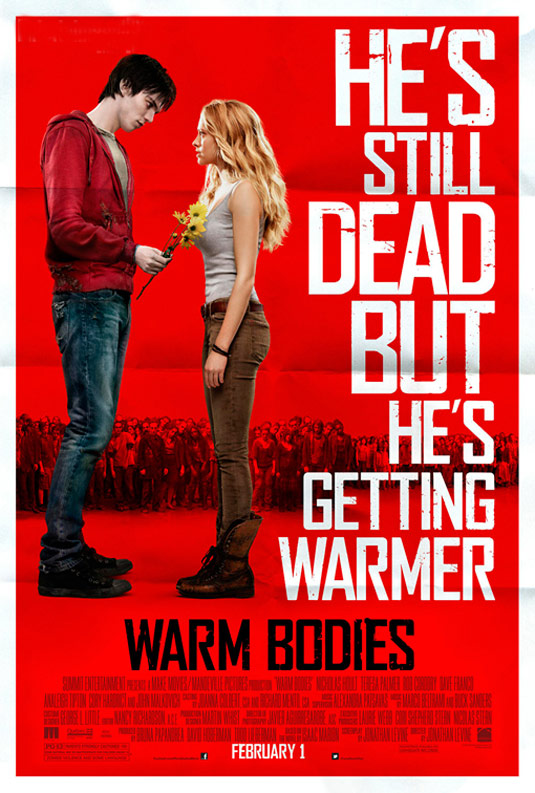Few stories endure as much rehashing as Shakespeare’s Romeo and Juliet. Besides straight adaptations, it’s been spun into every kind of film from a musical (West Side Story), to an animated feature (Gnomeo and Juliet), to B-grade trash (Tromeo and Juliet). The bard’s tale takes an especially twisted turn – albeit loosely – in Warm Bodies, a love story with just a touch of necrophilia.
Based on a book by Isaac Marion, the film opens on a desolate, post-apocalyptic city where R (Nicholas Hoult) and his fellow zombies wander an abandoned airport. Strangely self-aware, he begins to suffer an existential crisis articulated through a series of witty voice overs, in which he examines his lonely, aimless being. His only solace is the record collection he keeps in the commercial jet that serves as his home, and the occasional grunts he exchanges with an undead peer (Rob Corddry).

His uneventful life changes when he ambushes a group of survivors and falls for Julie (Teresa Palmer), the daughter of a colony leader (John Malkovich) intent on destroying the brain-eating menace that outnumbers humans. (R and Julie – get it?) After saving her from being devoured by his comrades – and by a deadlier subset of zombies known as Bonies – the two discover that their unusual relationship somehow sparks new life in the living dead. With her father’s militia on their tail, the couple sets out to convince everyone that the walking corpses may not be corpses after all.
The film fell into the hands of Jonathan Levine, who stepped up the challenge of writing and directing the seemingly unadaptable premise with mixed results. At first, his use of indie aesthetics like natural lighting and atmospheric flashbacks begs the viewer to take the film seriously, a hard sell considering that the first obstacle deals with Julie finding out that R killed her boyfriend, Perry (Dave Franco), on the day they met. Instead of eliminating this unsettling plot point, Levine chooses to relish it by repeatedly showing R scarfing down Perry’s brains, a sight that makes it impossible to sympathize with the young zombie. While it was probably meant to be poetic (as R explains, zombies eat the brains of their victims so they can experience their memories), the bold move only takes away from an already unbelievable romance.

The approach also butts heads with a more action-packed second half – judging from his previous work on films such as the cancer dramedy 50/50, Levine is no action director, nor does he try to be one. The restraint is commendable, up until he wastes what could have been one sweet zombie-on-zombie rumble. Whether it was motivated by studio pressure or the limits of his source material, the feeling of reluctance continues during the comedic moments, where Levine appears to set aside his own sense of humor for broad jokes. The few moments of cleverness he does sneak in are the most rewarding, primarily due to the way they utilize music. In one scene, R is introduced listening to a vinyl copy of John Waite’s cheesy ballad Missing You, and the song provokes laughter later when it serves as the absurd soundtrack to the couple’s violent meet-cute.
Despite a valiant effort from Levine, and an immersive performance from Hoult, Warm Bodies fails to offer enough scares, laughs, or romance to make the hard-to-swallow concept worthwhile. Like the star-crossed lovers Romeo and Juliet, mainstream cinema’s first successful zombie rom-com is just not meant to be.
Warm Bodies shuffles into theaters on February 1st.

